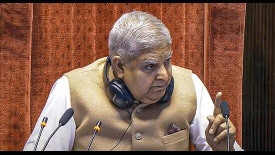In Tamil Nadu, the ruling Dravida Munnetra Kazhagam (DMK) criticized him for his remarks on the judiciary on the recent order of the Supreme Court for the President’s recent order for the President’s approved time.
DMK also said that the Vice President’s criticism regarding the system of the court is “immoral”.
The party’s Deputy General Secretary and Rajya Sabha member Tiruchi Shiva said, “According to the Constitution, under the sharing of powers, the executive, legislature and the judiciary have different powers.”
He posted on the social media forum ‘X’ and said, “When all three work in their respective areas, no one should forget that the constitution is supreme. Recently, citing Article 142 in the judgment of the Supreme Court on the role of governors and the President, it has undoubtedly established that no one can stop the bills passed by the legislature indefinitely in the name of being a constitutional authority. ‘
The senior leader said, “The comments of Vice President Jagdeep Dhankhar on this decision of the Supreme Court are immoral. Every citizen should know that “the rule of law” in India is intact. “
Vice President Jagdeep Dhankhar on Thursday questioned the judiciary setting a deadline for the President’s decision and working as a ‘Super Parliament’, saying that the Supreme Court cannot fract a ‘nuclear missile’ on democratic forces.
Dhankhar made this strong comment towards the judiciary while addressing the trainees of the Rajya Sabha. A few days ago, the Supreme Court had set a deadline for the approval of the President on the Bills laid down by the Governor for the President’s consideration.
He had said, “We have judges who will enact laws, who will work for the executive, which will act as a super parliament and there will be no accountability, because the law of the country does not apply to them.”
The Vice President termed Article 142 of the Constitution, which provided full powers to the Supreme Court, called “nuclear missile against the democratic forces available round the clock to the judiciary”.
